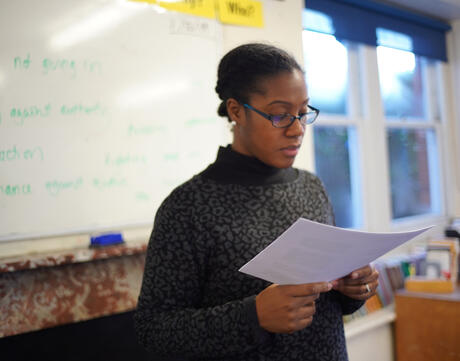
January Assemblies
Facing History Approach to Assemblies
Assemblies are a critical part of the school day. Regular assemblies provide an opportunity to bring your students together in order to introduce important issues and share your school’s values and priorities. Utilised correctly, assemblies have the potential to build an inclusive and supportive school community.
At Facing History, our assemblies have been designed to introduce students to significant annual and/or historical events, whilst supporting them to become empathetic and critical thinkers. Each assembly also provides students with opportunities to share their thoughts with each other, helping them to develop oracy and listening skills. The assemblies last for approximately 20 minutes, but can be adapted to suit your specific timing requirements.
Facing History assemblies do not require specialist knowledge and are suitable for use in a KS3 or KS4 assembly or in tutor time/PSHE. Some assemblies have been adapted from existing Facing History lessons and resources available on our website, while others have been newly created.
Assemblies in January
There are four assemblies available for use in January 2023.
Assembly PowerPoints
Making a Difference
How can young people make a difference in their local communities? The New Year is often a time of reflection and change. This assembly guides KS3 and KS4 students to think about how they can make a difference within their school community and their local community. Students are given information about young people who are currently making a difference and are challenged to do the same.
World Religion Day
What is World Religion Day and what can young people do to promote religious tolerance and harmony? This assembly guides KS3 and KS4 students to explore the words of the late MP Jo Cox, and to consider what the term ‘more in common’ actually means. This assembly also draws on statistics released by the Home Office in relation to religious hate crime and prompts young people to consider what they can do to promote religious tolerance both within their school community and their local community.
Dr. Martin Luther King Jr. Day
Who is Dr. Martin Luther King Jr. and what is the significance of his legacy? This assembly gives KS3 and KS4 students information about the life of Dr. Martin Luther King Jr. and the challenges he faced. This assembly gives students the opportunity to listen to Dr. King’s ‘I Have a Dream’ speech and guides them towards considering the kind of world they want to live in and what responsibility they have in bringing about such a world. Finally, this assembly also includes an additional whole school challenge in the form of a found poem to help continue discussions about Dr. King’s ‘I Have a Dream’ speech.
Holocaust Memorial Day
What is Holocaust Memorial Day and why should we remember the past? The theme for Holocaust Memorial Day 2023 is ‘Ordinary People’ and this assembly guides young people to think about the importance of memorialisation and about why we make the choices that we make. This idea is expanded through looking at the Kindertransport: students listen to the testimonies of some of the ordinary people who came to the UK in the Kindertransports as they share their experiences of moving to a new country whilst fleeing persecution. This assembly asks young people to reflect on these experiences and to consider why the stories of the Kindertransport should not be forgotten.
Notes for Use
Download the student-facing slides here. While you may need to modify these to meet the needs of your students, please note that Facing History and Ourselves does not endorse any changes that alter the presentation's content or original layout.



